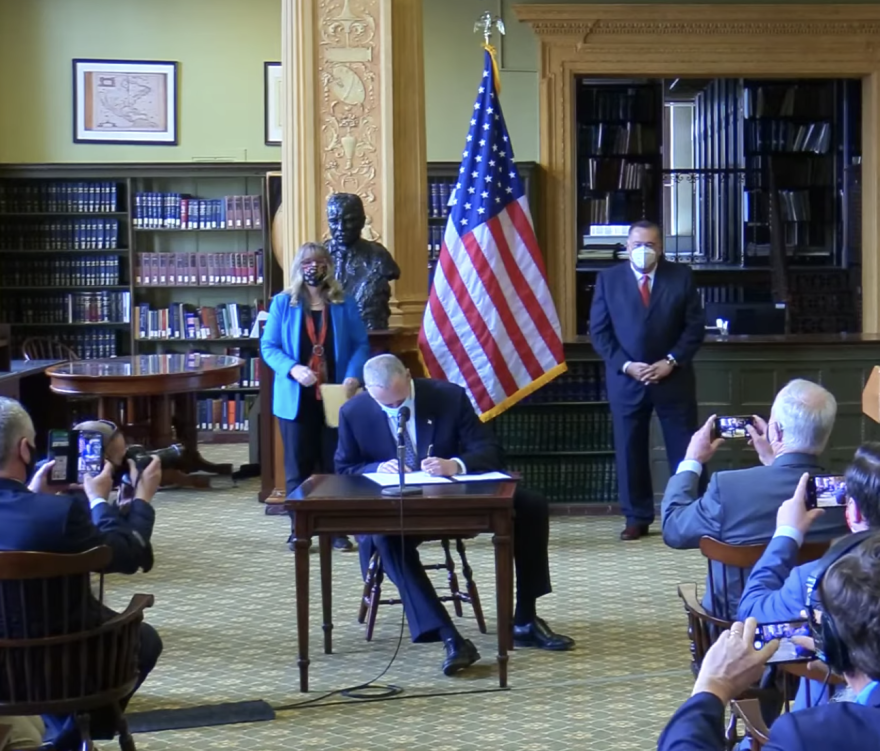Gov. Charlie Baker today signed a landmark climate bill into law, setting the state on a path to reach net zero emissions by 2050.
The wide-ranging legislation establishes new appliance efficiency standards, requires Massachusetts to reduce its carbon emissions by at least 50 percent below 1990 levels by 2030, and sets emission reduction targets every five years for six sectors of the economy: transportation; electric power; industrial processes; commercial and industrial heating and cooling; residential heating and cooling; and natural gas distribution and service.
It also requires Massachusetts to buy more electricity from offshore wind, puts $12 million towards clean energy workforce development for minority and women owned small businesses, environmental justice communities, and fossil fuel workers, and allows municipalities to adopt local net-zero stretch codes, which promotes new construction that doesn’t use fossil fuels.
In addition, the new law defines environmental justice communities based on race, income and language-proficiency criteria, requiring the state do more to address the needs of residents in these communities.
During a bill-signing ceremony, Baker said this legislation makes Massachusetts a national leader on climate issues.
"I’m deeply proud that we managed to come together to create this bill," he said, "which sets the commonwealth on a path to achieve net zero emissions by 2050. And I’m so proud that we got there together."
Baker’s signature ends months of shuttling the legislation back and forth with lawmakers. In fact, Baker vetoed the climate bill the first time it reached his desk over several concerns, including several about how rigid emission reduction goals could impact housing production. Lawmakers refiled the bill shortly after, and Baker returned it again with amendments. Many were adopted, but not all.
A notable exception was a more ambitious milestone lawmakers wanted for 2030; the Baker administration set a target for a 45 percent reduction goal, while the Legislature sought a 50 percent reduction. After some compromise on both sides, Baker finally signed the bill today with the level set at 45 percent.
During the ceremony, lawmakers joked about what it took to get this climate legislation signed.
“I want to thank the governor for signing this bill today,” said House Speaker Ronald Mariano, a Quincy Democrat, “a bill that has more miles than my car — it’s gone back and forth enough.”
Baker leaned into it.
“What I really appreciate about this is, people just worked their way through and got to ‘yes,’ and delivered a bill that in many respects … continues to make Massachusetts a national leader on these issues,” the governor said.
Environmentalists across the state celebrated the passage of a law many consider “game changing.”
“This is definitely a landmark bill,” said Chris Powicki, an advocate with Sierra Club Cape Cod, who teaches renewable energy classes at Cape Cod Community College. “It puts Massachusetts back in a national leadership position, one that it first assumed with the passage of the 2008 Global Warming Solutions Act.”
That law is considered the last major climate package passed by the state. It required major cuts to greenhouse gas emissions, including a provision that set a 2020 goal of lowering emissions 25 percent below 1990 levels. By 2050, the goal was to lower emissions by 80 percent.
“Since then certainly we’ve made lots of progress,” Powicki said, “but this new legislation puts meat on the bones in that it takes the goals that were set out in 2008, and turns them into legally binding limits for 2050, and there are interim targets every five years.”
The legislation also calls for utilities to purchase an additional 2,400 megawatts of offshore wind — increasing the current requirement by more than 40%.
“Boosting the offshore wind procurement target to 5,600 megawatts is a huge step forward,” said Powicki. “Other states in New England have set high targets, and Massachusetts was stuck on 3,200 megawatts for a while. Now we’re back in the game.”
Environmentalists say they hope the larger procurement signals to the offshore wind industry that Massachusetts wants to remain a leader in this space.
“With delays in the Vineyard Wind project there’s been, maybe, the perception that we’re falling behind, and that perception hopefully will go away,” Powicki said.
Because the legislation will require more energy efficiency, weatherization, and offshore wind projects — which has the potential to create local jobs for plumbers, electricians, contractors, and renewable energy experts.
"From a Cape Cod and the Islands perspective, maybe the biggest impact is going to be this clean energy sector becoming a more and more important component of our overall economy," he said. "There will certainly be more opportunities for electricians, plumbers, pipefitters that are going to be involved in changing out our fossil fuel, vehicle, and heating systems into electricity-based ones."
The governor hailed the new law as a roadmap toward environmental improvement that also respects economic considerations.
“This bill puts us on an ambitious path to achieving a cleaner and more livable commonwealth," Baker said, "while also creating economic development opportunities."








